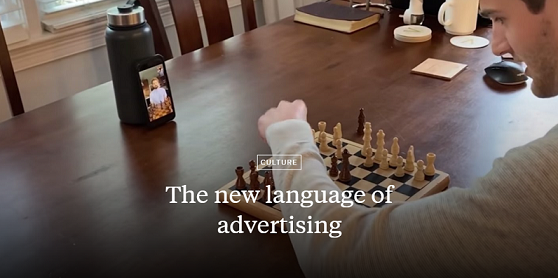 The pandemic is upending the language of advertising.
The pandemic is upending the language of advertising.
Hugs and handshakes are out. Finger-licking too. And with half the world in lockdown, standard backdrops for advertising—sporting events, busy streets, family reunions on religious holidays—now seem off-key, if not downright dangerous.
What will take their place?
So far, messaging by businesses has rightly focused on practical steps taken—closing workplaces, contributing to relief efforts—as well as how to help consumers access products and services. Beyond that, many express social distancing and community resilience. What comes after is still a work-in-progress, but it’s likely to eschew showiness and include an elevation of digital life.
In the social distancing bucket, LATAM Airlines flipped its tagline from “Together, Further,” to “Further, Together.” A Jack Daniel’s ad memorably employed footage of lockdown life in people’s homes, showing them playing chess via mobile chat and ping pong on makeshift kitchen tables and toasting each other with whiskey glasses across apartment windows.
The key, now more than ever, with economies paralyzed and the death toll mounting, is to be sensitive, with no overt hawking of products.
“This is not the time to try to get the vast majority of stories out,” Alexis Ohanian, investor and Reddit co-founder, told Fast Company. “Both from a sensitivity standpoint but also the futility of breaking through.” Even when there’s a clear way a business can help people at this time, Ohanian added, “make sure your messaging is still tactful, tasteful and not opportunistic.”
Looking ahead
Brands are already shifting gears. Volkswagen America last week pulled a celebrity-studded campaign for its new Atlas Cross Sport vehicle. Instead, it is running ads showing VW dealers in small towns across America promoting a new campaign that allows car buyers to defer payments, if needed.

Meanwhile, KFC, which coined the phrase “finger lickin’ good,” has suspended ads showing people licking their fingers while eating its fried chicken.
With not just finger licking but handshakes and hugs now taboo, new gestures have taken its place. “The Wuhan shake,” tapping feet together, as well as the elbow bump have shown up in social media footage around the world, the BBC reported last month.
There are indications that some of these new behaviors may have sticking power.
A US survey on pandemic attitudes by Wunderman Thompson Data found that while the majority expect to go back to their regular activities and behavior after the crisis, that’s not so much the case with person-to-person interactions.
While more than 70% expect to go back to frequenting restaurants, movie theaters and sporting and cultural events, the numbers fell for certain social interactions. 35% said they expect avoiding hugs to become the new normal and 36% expect to continue social distancing.
Forty-one percent said they do not expect to go back to kissing someone on the cheek by way of greeting, while 43% said they do not expect to resume shaking hands. The survey covered 500 adults in the United States and was conducted between March 20 and 23, 2020.
Considerate messaging
In countries with significant Muslim populations, the start of Ramadan in the final week of April will pose fresh questions for appropriate messaging. Ramadan is usually very social, with mass praying and family and friends meeting each evening to break fast together, capped by Hari Raya or Eid al Fitr celebrations at the end of a month of fasting.
To stop the spread of COVID-19, Singapore and Malaysia have already closed mosques and banned Ramadan bazaars, the evening markets selling cooked food for breaking of fast. Indonesia, where the celebration is known as Lebaran, is mulling a lockdown on city-dwellers to prevent the annual exodus to hometowns around the vast archipelago, having learned from China’s example during Lunar New Year in January.
With many businesses hurting and people losing their jobs, depictions of feasting and other celebrations even from home can be offensive to those suffering.
“Brands that are still planning to advertise during this period need to take into consideration that the staple scenes and messages of Ramadan will not resonate, or worse, go against the norm of social distancing and be insensitive to millions who are unable to meet with family or follow the usual religious rituals,” said Bernadette Duisters, a senior planner in Wunderman Thompson Jakarta.
“We need to explore how we can communicate the good values of Ramadhan—purity, goodness, modesty, forgiveness and togetherness—in this new reality.”
In China, the first country to be hit hard by the virus, one powerful symbol of family and community, the communal meal—where diners dip and scoop from shared dishes—has yet to make a return, whether in ads or in real life.
“The biggest thing is that the group dinner—family and friends coming over to play mahjong and eat—has gone away,” said Joyce Ling, Shanghai-based Chief Strategy Officer for Wunderman Thompson Greater China.
While the outbreak has peaked in China, people are still hesitant to get together. Many are still working from home and restaurants and stores are only slowly reopening. People are still wearing face masks when they go out and bracing for a second wave of infections, this time from imported cases.
The next shift, Ling said, could be less of an emphasis on social distancing but more of an embrace of digital life, which up till now has been regarded as somewhat of an unserious, lesser version of real life.
“Getting on TikTok used to be for the younger generation, now the older generation are also on,” she said. “It’s going to be okay to spend time on TikTok. It’s going to be okay to be a homebody and to spend time in the virtual world.
Because it is the real world now.”

